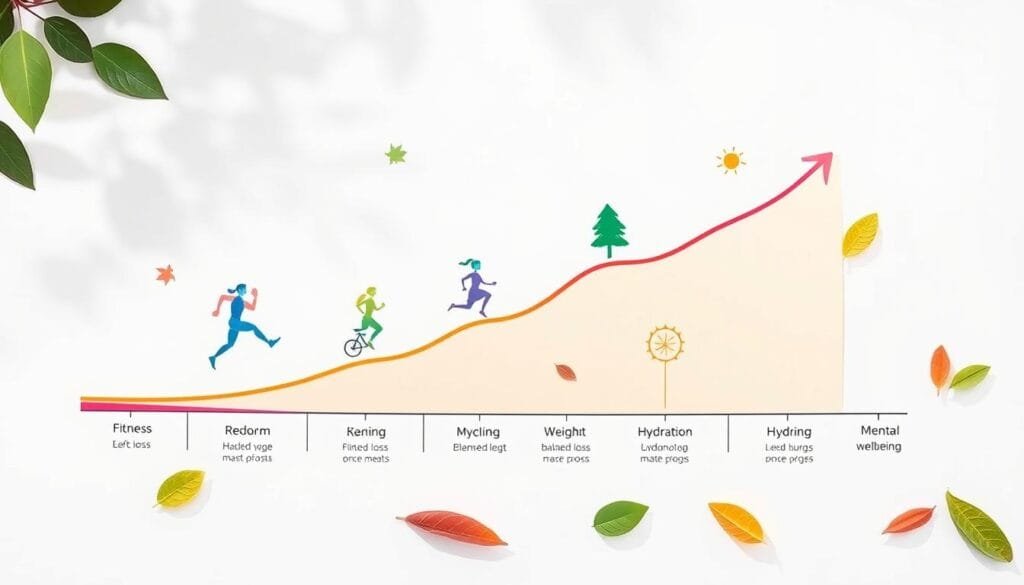Starting a healthy lifestyle means committing to your wellness journey. It takes courage and regular effort. Knowing our bodies are about 60% water is the first step. Staying hydrated, eating well, getting enough sleep, and exercising are key. This journey is not about quick, hard diets or extreme exercise. It’s about adding healthy behavior to your daily routine. Aim for wellness with goals that are real and gradual.
Key Takeaways
- Adopt simple changes like increasing your daily steps, aiming for a gradual rise from 2,000 to 10,000.
- Focus on consuming whole foods and prefer steaming, baking, or grilling over frying.
- Ensure you drink enough water to maintain your body’s hydration levels.
- Remember the importance of 7-9 hours of restful sleep for optimal health.
- Embrace a balanced approach that includes gradual dietary changes, consistent exercise, and reflective self-care.
Understanding the Fundamentals of a Healthy Lifestyle
A healthy lifestyle is built on consistent habits, balanced lifestyle, and including wellness pillars in daily life. Knowing these things helps us see why a whole wellness approach is important. This approach looks after physical, mental, and emotional health.
Defining What a Healthy Lifestyle Means
At its heart, a balanced lifestyle aligns daily habits with good health. This means eating well, staying active, sleeping enough, and handling stress. Together, these choices create a strong health foundation.
Why Consistency Beats Intensity in the Long Run
Making consistent habits part of every day is better than random, hard efforts. Regular exercise, kept up over time, helps stop heart disease and stroke early. It also boosts mental health and happiness.
The Role of Balance: Nutrition, Exercise, Sleep, and Mental Health
A balanced lifestyle includes key wellness parts: nutrition, exercise, sleep, and mental health. Each one is key to good health:
- Nutrition: Eating mostly whole, nutritious foods lowers the risk of chronic diseases. It also helps you live longer and healthier.
- Exercise: Moving regularly improves physical and mental health. It can help ease depression and anxiety.
- Sleep: Adults need about eight hours of sleep a night to best function. Too little sleep can lead to big health problems.
- Mental Health: Practices like meditation and keeping social ties can greatly help mental strength and health.
To truly live healthy, we need to balance all wellness parts, not just one or two. This broad approach ensures wellness and more than just not being sick.
Setting Realistic Goals and Expectations
Starting a health journey means setting goals you can really achieve. It’s key to match these goals with what you can do and how much time you have. When goals are within reach, you’re more likely to stick with them and feel good about your progress.
How to Set Achievable Health Goals
Setting attainable health goals starts with a few careful steps. Define clear goals, like losing half to two pounds a week, which is both healthy and doable. It’s also important to know where you’re starting from. For example, seeing how quitting smoking boosts life span and cuts disease risk can motivate you.
Use tools and resources like fitness trackers or online health classes. They keep you on track and offer advice. Setting SMART goals makes sure your aims fit your lifestyle.
The Importance of Small Wins and Celebrating Progress
It’s vital to celebrate small achievements. They motivate you to keep up healthy habits. Small victories, like sticking to healthy eating for a week or boosting your exercise routine, lift your spirits.
Celebrate your wins. Maybe share them with friends or treat yourself. Be willing to change goals as needed to avoid getting upset. This way, your health goals grow with you.

Everyone’s health journey is their own. Every small step matters towards a bigger goal. By keeping expectations real and cherishing each milestone, you make your journey towards better health lasting, joyful, and successful.
How to Start a Healthy Lifestyle
Starting a healthy lifestyle means adding positive habits and changing your day a little at a time. These small steps can make a big difference in your health for years to come. Here’s how to begin this important change:
- Hydration: Start your day with a glass of water to activate your internal organs and keep hydrated throughout the day. Hydration supports vital body functions and enhances metabolism.
- Dietary Adjustments: Swap unhealthy snacks for nourishing alternatives high in protein and fiber, which better regulate appetite and cravings. Consider meal planning and preparation to ensure consistent consumption of nutritious meals.
- Exercise: Engage in daily moderate exercise to boost cardiovascular health and overall wellbeing. This can include at-home workouts or simply opting to walk more daily.
- Mental and Emotional Wellbeing: Manage stress effectively through mindfulness practices or other stress-relief activities to prevent stress-related weight gain and improve your mental health.
- Health Monitoring: Utilize health apps to track your physical activity levels, sleep quality, and heart rate to stay informed about your health status.
Health investments not only make you healthier now but also ensure a better future. A comparison below shows how lifestyle improvements can boost your health quality:
| Aspect | Before Changes | After Changes |
|---|---|---|
| Energy Levels | Low | High |
| Health Risks | Higher (due to inactivity and poor diet) | Lower |
| Emotional Wellbeing | Unstable | Improved |
| Sleep Quality | Poor | Good (7-8 hours) |

It might be tough at first, but sticking to these changes brings big rewards. Start with small, easy positive habits. Then, slowly add more daily routine changes. These health investments will make a big difference. Your future self will be grateful.
Navigating Nutrition: From Fads to Fundamentals
In an era of changing diet trends, it’s important to focus on proven nutrition basics. Knowing about a balanced diet helps people make smart health choices. It’s better to choose whole foods rather than quick, restrictive diets.
Understanding Macronutrients and Their Role
Macronutrients are carbs, proteins, and fats. They are vital for our health. Carbs give us energy, proteins help repair tissues, and fats are good for cells and hormones.
The Downside of Restrictive Diets and the Perils of Processed Foods
Restrictive diets can harm your health by missing nutrients. Processed foods may have bad fats, sugars, and additives. They cause health issues. Choosing whole foods and a balanced diet is key.
How to Incorporate Whole Foods Into Your Everyday Meals
Adding whole foods to meals is easy and need not be costly. Try whole grains, more fruits and veggies, and fresh meats instead of processed ones. This improves diet quality. Including plant-based foods and lean proteins balances the diet, aiding in health.
Good nutrition isn’t about the latest trend. It’s about understanding key diet principles. Make choices that include many unprocessed foods. This leads to a healthier diet.
A look at research shows healthy eating should be a consistent choice. It’s about making good choices for our bodies. Today’s balanced diet tactics fight processed food, offering nutrient-rich plans.
Adopting these nutrition basics can lower disease risks and environmental harm. This benefits both individual health and our planet.
Integrating Exercise Into Your Daily Routine
For your health, a balanced workout is important. To make this a habit, find physical activities you love. Whether dancing, hiking, or yoga, loving your exercises means you’ll likely keep doing them regularly.
Finding Physical Activities That You Enjoy
Finding fun activities is not only enjoyable but also good for you. Swimming, team sports, or biking can lift your mood and make you fitter. They don’t even feel like hard work.
The Importance of Strength Training and Cardio for Overall Health
A balanced workout has both strength exercises and cardio. These are key to avoid health problems and get fit. Strength training builds muscle and boosts your metabolism. Cardio makes your heart strong and helps manage weight. Mixing these leads to better health and keeps you exercising regularly.

| Activity Type | Duration | Frequency | Intensity |
|---|---|---|---|
| Moderate Aerobic | 150 minutes | Weekly | Moderate |
| Vigorous Aerobic | 75 minutes | Weekly | High |
| Strength Training | Varies | 2 times a week | Moderate to High |
Adding a variety of these activities every week makes your workout fun and well-rounded. It keeps things interesting and lowers injury risk. Remember, sticking to your workout and choosing fun exercises is key to staying fit long-term.
The Overlooked Pillars: Sleep and Mental Wellbeing
In our busy world, sleep and mental health often go unnoticed. Getting enough sleep is key for staying healthy. It helps our mood and our mind work better. By focusing on sleep, stress management, and staying mindful, we can feel happier and stronger.
Strategies for Improving Sleep Quality
People of all ages need different amounts of sleep. However, the aim is to feel restful and refreshed. Adults should sleep 7 to 9 hours. Teens need about 8 to 10 hours to be their sharpest. Kids need even more sleep for their growing bodies and brains.
To avoid serious health issues, a regular sleep schedule is vital. Cutting down on screen time before bed helps. So does a cozy sleep space and sticking to a sleep routine. These steps greatly improve sleep.
Maintaining Mental Health Through Mindfulness and Stress Management
Mindfulness is more than just relaxing. It helps us be fully present and aware. Practices like meditation, deep breathing, and yoga are key. They help us handle stress and keep our mental health in check.
Working out is also important. It releases happy chemicals in our brain. Any physical activity, light or heavy, benefits our sleep, mood, and physical health.
| Age Group | Recommended Sleep | Ideal Practices for Sleep Improvement |
|---|---|---|
| Adults (18+ years) | 7-9 hours | Mindfulness, reduced screen time |
| Teenagers (14-17 years) | 8-10 hours | Consistent sleep schedule, mindfulness exercises |
| School-aged children (6-13 years) | 9-12 hours | Creating a bedtime routine, limiting stimulating activities before bedtime |
Focusing on better sleep, mindfulness, and stress management helps us all. It makes us mentally tougher and improves our life. So, these habits are very important for our mental wellness.
Conclusion
Living healthy is more of a long run than a quick sprint. It starts when we think about our health habits. We then get ready by setting real, doable goals.
Next, we act on these plans, changing our daily routines for the better. Finally, these new choices become part of our life in the maintenance phase. This is when we’ve truly changed for the better.
We find our own pace in this journey, facing and overcoming any challenges. Healthful living isn’t always easy. We might face problems like not enough time, money troubles, or eating habits that are hard to break.
Yet, by putting our health first, being smart with our money for fitness, making healthier food, and getting friends involved, we make strong habits that last. Aim for 150 minutes of activity each week and eat plenty of veggies, fruits, lean meats, and whole grains.
Our goal is to make long-lasting changes based on daily good choices. This needs patience, a strong will, and being open to change. Celebrating small wins helps keep us committed.
Think about the good things like doing better at work, staying away from diseases, and just feeling great. These benefits make it all worth it. Every step counts towards a bigger, healthier life. The best prize is feeling lively and full of health.
FAQ
What are the first steps to beginning a wellness journey?
Starting your wellness journey involves setting goals that are good for your health. You should focus on building healthy habits every day. This can turn into a lifestyle change for better health.
What does a balanced lifestyle consist of?
Living a balanced life means eating well, exercising, sleeping enough, and caring for your mind. You need to keep up these good habits all the time. This helps you stay healthy for long.
How can I ensure my health goals are achievable?
Make sure your health goals are clear and realistic. Think about what you can really do. It’s also key to feel good about every success, even the small ones, as you go along.
What are the benefits of incorporating whole foods into my diet?
Whole foods give you lots of nutrients because they are not processed. Eating these foods helps you have a balanced diet. It’s a way to eat healthier and avoid food that’s not good for you.
How can I find physical activities that I enjoy?
To enjoy your exercise, try different kinds until you find what you like. You should aim to make exercise fun. This way, it becomes a good part of your daily life.
What strategies can help improve my sleep quality?
Getting better sleep means having a calming routine at night. You should make sleep a top priority. Using ways to relax, like deep breathing or cutting down screen time before bed, helps too.
Why is consistency important in a healthy lifestyle?
Being consistent means you’re more likely to keep up good habits. It’s better to be steady than to do a lot all at once. This helps make sure you can keep going in the long run.
How significant are small wins in my progress towards better health?
Small wins are very important because they motivate you. They make you feel good about your progress. Remembering to celebrate these moments helps keep a positive attitude as you work on your health.
